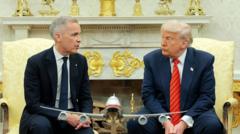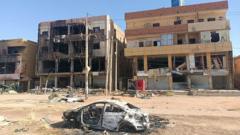In a significant escalation of its response to the ongoing conflict in Sudan, the United States has announced new sanctions following evidence that the Sudanese military deployed chemical weapons during its struggle against the Rapid Support Forces (RSF). This revelation adds to the existing humanitarian toll, with over 150,000 lives lost since the conflict erupted two years ago.
US Sanctions Sudan for Chemical Weapons Use Amid Ongoing Civil War

US Sanctions Sudan for Chemical Weapons Use Amid Ongoing Civil War
The United States has enacted new sanctions against Sudan after determining that it employed chemical weapons in its brutal civil war, exacerbating an already dire humanitarian crisis. The sanctions will restrict US exports and impose borrowing limits starting June 6.
The US sanctions, as detailed by State Department spokesperson Tammy Bruce, will impose restrictions on exports to Sudan and set new financial borrowing limits beginning June 6. The sanctions aim to hold the government accountable for its alleged war crimes and violation of the Chemical Weapons Convention (CWC), to which Sudan is a signatory.
Evidence presented has pointed to the use of chlorine gas in attacks, leading to severe health repercussions, including fatal outcomes. Amidst the military’s recapture of Khartoum, fighting remains active in other regions. The US call for the cessation of chemical weapon use signifies its commitment to address chemical weapons proliferation.
Previous sanctions were already levied against key leaders from both the military and the RSF amid allegations of war crimes and genocide. The US is also navigating geopolitical tensions, with accusations against the UAE for providing military support to the RSF sparking further complexity in the situation.
With nearly a third of Sudan's population in need of humanitarian assistance, the latest sanctions reflect an urgent response to the ongoing violations against civilians and will likely affect Sudan's geopolitical ties as the conflict continues to escalate.
In conclusion, the US sanctions signify a crucial step toward accountability in a deeply troubled region, even as questions linger about their actual impact on a nation beset by violence and humanitarian crises.
Evidence presented has pointed to the use of chlorine gas in attacks, leading to severe health repercussions, including fatal outcomes. Amidst the military’s recapture of Khartoum, fighting remains active in other regions. The US call for the cessation of chemical weapon use signifies its commitment to address chemical weapons proliferation.
Previous sanctions were already levied against key leaders from both the military and the RSF amid allegations of war crimes and genocide. The US is also navigating geopolitical tensions, with accusations against the UAE for providing military support to the RSF sparking further complexity in the situation.
With nearly a third of Sudan's population in need of humanitarian assistance, the latest sanctions reflect an urgent response to the ongoing violations against civilians and will likely affect Sudan's geopolitical ties as the conflict continues to escalate.
In conclusion, the US sanctions signify a crucial step toward accountability in a deeply troubled region, even as questions linger about their actual impact on a nation beset by violence and humanitarian crises.



















